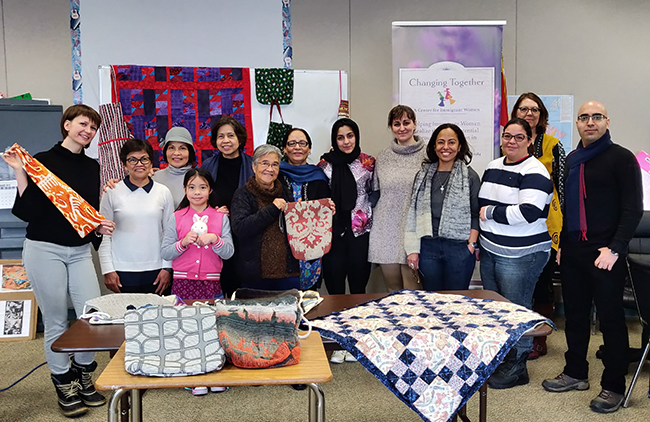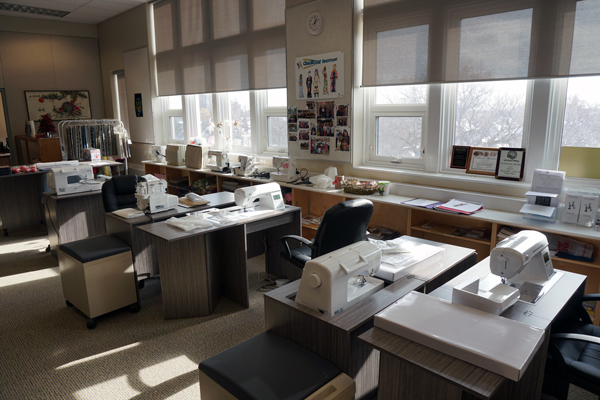
The program is Sewing Peace. And the place is Changing Together, a downtown Edmonton organization that offers services to immigrants, especially women.
Raquel Ariada takes three fabrics from a woman who has appeared at the door, holds them to the light and offers thoughts. The woman, who has brought the fabrics to Changing Together with hopes to sew them, eventually walks into the room and sits at one of the machines. Nearby, five other women, all originally from different parts of the world, sit, quietly sewing. Ariada periodically checks in on them as she, too, sews. "They want to learn to how to improve their [sewing] knowledge," she says. "When you arrive new to a new place, normally you are very lost. With this program you feel you are a part of the community, the city."
The program is Sewing Peace. And the place is Changing Together, a downtown Edmonton organization that offers services to immigrants, especially women. Ariada, who immigrated to Canada four years ago from Spain with her husband and two children, and who first came to Changing Together to improve her English, is doing exactly what the creators of Sewing Peace hoped participants would: building links between women who are new to Canada. Ariada isn't the workshop leader, or teacher, but instead a student who just happens to know a bit more about sewing. The other students look up to her.
Sewing Peace is the brainchild of Pedram Veisi, a University of Alberta Master of Science graduate and former resident of International House, a residence for Canadian and international students. In 2016, his connection to International House allowed him the opportunity to apply for a $10,000 Davis Project for Peace grant. Veisi's idea, which several others helped make a reality, was a sewing studio for refugee women. The idea in part had been sparked by Canada's 2015 decision to re-settle more than 25,000 refugees displaced by the war in Syria.
"I noticed that they have support from the government for up to one year, and after that they're on their own," he says. "We had this idea of maybe we can apply for this grant and try to use it to start something that can be helpful in a way. The idea was a sewing studio that gets to a point that it can actually generate some revenue."
The idea first required a space. Before he even applied for the Davis grant, Veisi contacted Changing Together to see if they might be interested in partnering on a sewing project like this. "They said we actually have many women who are interested in this but we don't have the equipment - we only have a couple of machines," he says.
Next, as the grant came together, work began and the community threw itself behind the studio idea. Companies donated six sewing or serger machines, while the grant eventually allowed Veisi and helpers to purchase six additional ones. A sewing-machine supplier donated supplies and fabric and equipment. Changing Together provided the space. A studio was born. And in October 2018, the project formally started with about 15 participants. Veisi says he hopes up to 50 could be part of the program by the summer of 2019. 
"The important part is the women come together," Veisi says. "The idea was creating the space that can maybe help them spend time together and, especially with sewing, there are so many cultural aspects. They can share the space and experiences."
Veisi says the plight of Syrian refugees was "heartbreaking" and one he could somewhat understand, if only a little, because he too immigrated to Canada. "I know how it feels, even though I didn't have that situation in my country," he says. But the connections ran deeper. His mother and sister have recently come to Canada from Iran as well, settling in Saskatoon. Fittingly, he says, his mother found community through a program that sees them sew with other women newcomers. Indeed, Veisi says his mother's experience helped him think of spreading the idea to Edmonton. "I actually like how that centre was affecting her - to be able to meet more people and trying to integrate was very rewarding. I was seeing this studio being able to play the same role."
But what about Veisi's mention of revenue? Will Sewing Peace eventually be a source of income for the women who participate? Veisi hopes so. "I hope we can actually start a brand," he says. "Like coming up with some products that these women could sell, potentially, and starting a line of products using the studio."
The hope is also that the first women to experience the program will in turn become trainers for the next round of women.
Back at Changing Together, Raquel Ariada is well on her way to doing just that. "This program is very interesting because I know something and I share with another woman," she says. "But maybe the other woman knows another something I don't know. We help each other, we help together."